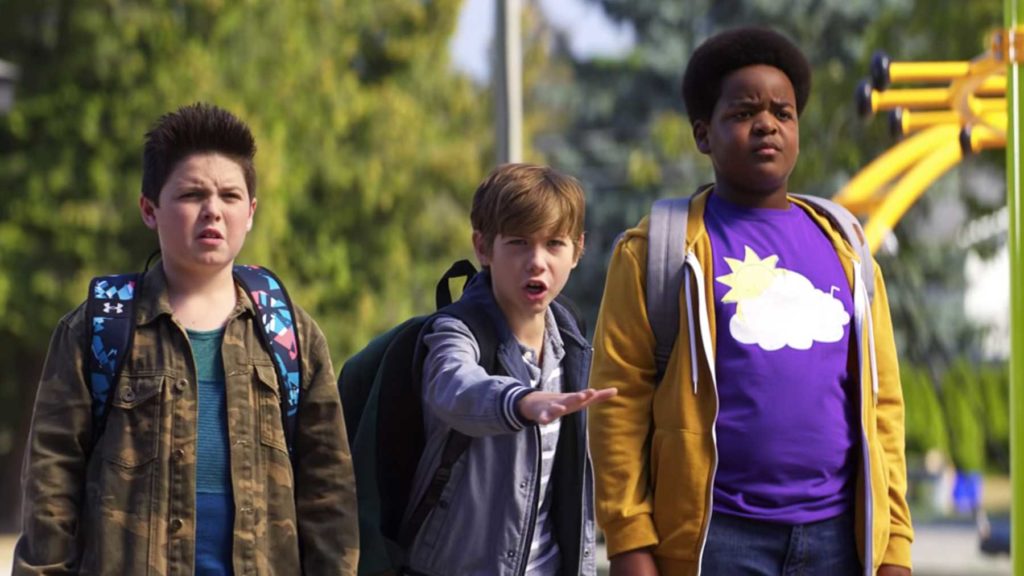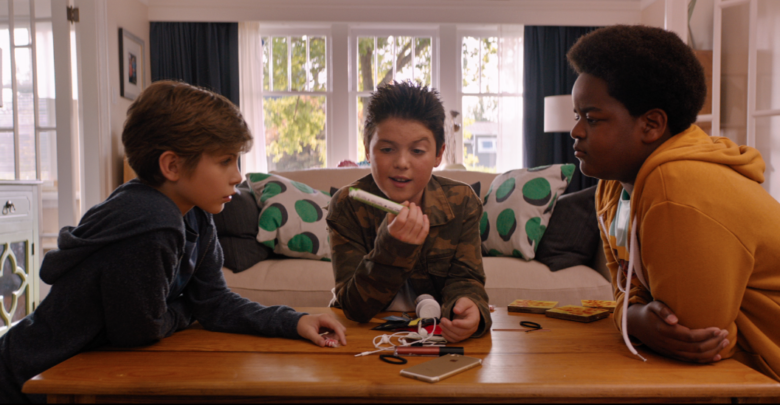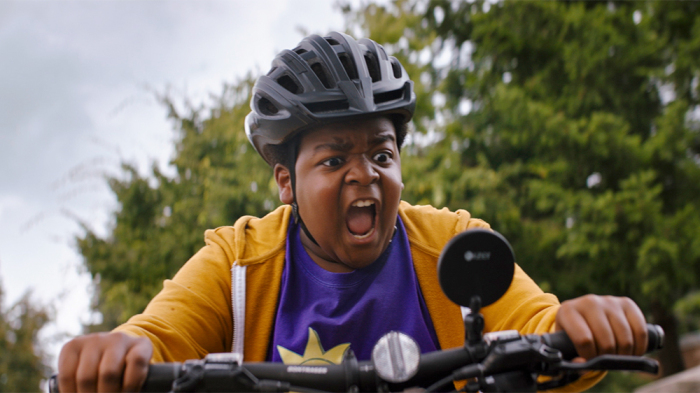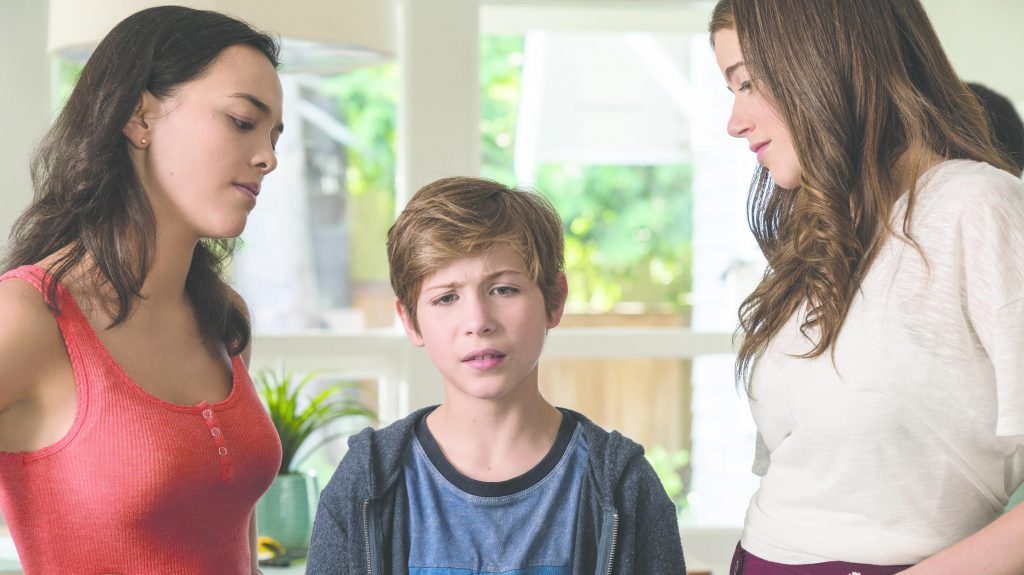
There are multiple levels of storytelling at work in Good Boys, and multiple levels of posturing as well. Directed by Gene Stupnitsky from a script he wrote with Lee Eisenberg, the movie follows three hapless sixth-graders in their desperate attempts to prove their sexual and narcotic bona fides. Their false bravado—one routine boast revolves around taking multiple sips of beer—is reflective of Good Boys itself, which bills itself as a raunchy sex comedy but whose primary focus is aging and friendship. Sure, there are filthy jokes and excruciating embarrassments, but underlying all of the gross-out humor and bawdy mishaps is a foundation of concentrated, sugary sweetness. It’s a gentle lamb dressed up in a horny wolf’s clothing.
“Superbad for tweens” is a simplified but nonetheless accurate logline here, and not just because Seth Rogen and Evan Goldberg serve as producers. Much like how that 2007 mainstay used two teens’ frantic efforts as the scaffolding for its poignant exploration of a longtime but quietly fraying relationship, Good Boys wields its “one crazy misadventure” premise to mine tension and pathos. The key difference is that, thanks to their pubescent status, the heroes of Good Boys aren’t just sexually inexperienced; they’re sexually clueless.
And that, more than anything else, is what makes the movie funny. Much of Good Boys’ humor is familiar, but it manages to carve out some distinct comic territory thanks to the vast gap between how much explicit knowledge its characters claim to possess and how much they actually know. For example, were you aware that tampons are a form of anal birth control? Or that a vernacular term for semen is pronounced “koom”? I’m quite certain you had no idea of the true definition of nymphomaniac: someone who has sex on both land and sea.

The confident purveyor of these nuggets of received wisdom is Max (Jacob Tremblay, from Room and The Predator), and despite his carnal naïveté, he’s probably the most normal of the trio who years ago dubbed themselves the Bean Bag Boys. (“That’s a dope-ass name,” a popular peer tells him, proof that all 12-year-olds are idiots, regardless of their position on the social food chain.) Max’s confederates are Troy (Brady Noon, formerly Michael Pitt’s son on Boardwalk Empire), a manic cut-up who’s also an aspiring singer, and Lucas (Keith L. Williams, very good), an assiduous rule-follower who’s terrified of disappointing authority figures. Eager to make inroads with the cool crowd, these nerds score an invite to a “kissing party”, which obviously inspires panic as well as excitement. The ensuing narrative follows two related paths: the boys’ feverish efforts to educate themselves on the finer points of lip-locking, and their attempt to actually attend the party. Naturally, both tasks are beset by various catastrophes.
Good Boys, in other words, is an episodic feature: a daisy chain of sexual and navigational disasters, each calamity feeding into the next. This means that its humor is inherently hit-and-miss, and as is often the case, the biggest swings often generate the wildest whiffs. Stupnitsky and Eisenberg have a fine ear for youthful banter—the reflexive insults and macho bluster, the social anxiety and cliquey ostracism—but their broader set pieces are flat and uninspired. A sequence where the boys invade a frat house starts out well enough—a throwaway remark that reveals racial face blindness is particularly funny—but it culminates in a chaotic paintball war that isn’t executed with sufficient sharpness to properly land. And a scene where they’re forced to run across a freeway fails to produce any surprises.

Thankfully, Good Boys doesn’t rely exclusively on outlandish gags for its laughs. It also demonstrates a keen understanding of boyhood friendships and adolescent angst, and it expertly locates the sweet spot between warm-glow nostalgia and cringe comedy. You may find yourself wincing when the boys hunker down to play spin the bottle, or when Max uses a go-between to communicate with his crush (Orphan Black’s Millie Davis, who co-starred with Tremblay in Wonder), but your discomfort is a testament to the film’s authenticity, the way it speaks to universal experiences and agonies. At the same time, certain touches are undeniably contemporary and even progressive, such as a student-helmed task force dedicated to eradicating bullying, or an emphasis on the concept of consent.
Lucas, as it happens, takes the lead on both of those fronts, which reveals a curious truth about Good Boys: He’s the only one who’s interesting. Max and Thor are likable enough, and Tremblay and Noon both deliver solid performances that nimbly balance swagger with unease, but they’re essentially generic stand-ins: the epitome of relatable ridiculousness. Lucas, on the other hand, has an actual personality. He is the most tender of the group and also the most extreme, and he abides by his moral code—follow the rules, treat others with respect, “Bean Bag Boys for Life”—with a zeal that borders on pathology. Williams’s performance is a brilliant display of hyperactive decency; when Lucas encounters a weary police officer (the reliably droll Sam Richardson), his spasmodic confession is one of the movie’s funniest moments, as is his prior outrage upon learning that he unwittingly participated in a drug crime.

The instigators of that criminal conspiracy are Hannah (Molly Gordon) and Lily (Midori Francis), two girls who are a few years older than our trio, and infinitely more mature. Not that they have especially lofty goals; they just want to procure some molly, a mission that the boys repeatedly sabotage, first inadvertently, then out of a sense of ethical duty. The ensuing conflict between these gendered groups—which begins as outright antagonism before turning into reluctant partnership, and which at one point involves Lily transforming into a teenage terminator—is suitably amusing, but Hannah and Lily are so appealing that you may wish the film would ditch its titular tweens and follow its bad girls instead. That is, it’s tempting to imagine a movie where Good Boys turns into Booksmart (also featuring Gordon) and pursues a female-focused arc similar to Olivia Wilde’s excellent coming-of-age story. The inevitable comparisons are unfavorable; as enjoyable as Good Boys may be, it lacks the fluidity of Wilde’s craft or the depth of Booksmart’s supporting cast.
What it does share, if not quite as gracefully, is a disarming sincerity. In one illuminating scene, Hannah and Lily casually inform the kids that childhood friendships are fundamentally transitory—that they’re formed by virtue of logistical convenience rather than personal harmony—and the detonation of that truth bomb animates the film’s sense of wistfulness. The zanier the boys’ escapades get, the more caustic their disagreements grow, and eventually it becomes clear that the real suspense of Good Boys isn’t whether they’ll make the party or get the girl but whether the Bean Bag Boys will survive as a gang. A late tearful conversation is laced with genuine pain and sadness as well as shouts and slurs; if anything, the movie yanks too hard on your heartstrings, imploring you to sympathize with these lovable losers.
Mission accomplished; in the end, I succumbed. Besides, a surfeit of sweetness is hardly damning in an ostensible raunch flick, especially one that mingles a subplot about divorce with a running gag about anal beads without ever feeling tonally discordant. And Good Boys, for all its faults, is highly entertaining as both a comedy of sexual misunderstandings and a drama of heartfelt relationships. Or as Max might say: It’s a real nymphomaniac.
Grade: B
Jeremy Beck is the editor-in-chief of MovieManifesto. He watches more movies and television than he probably should.
